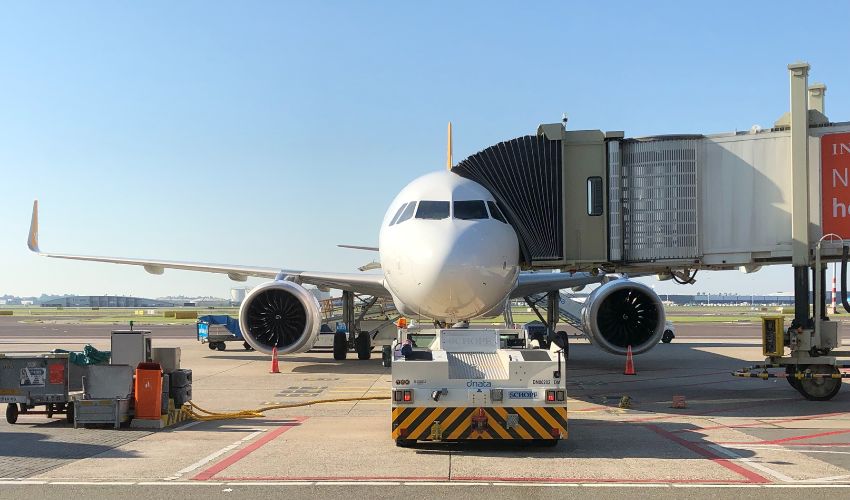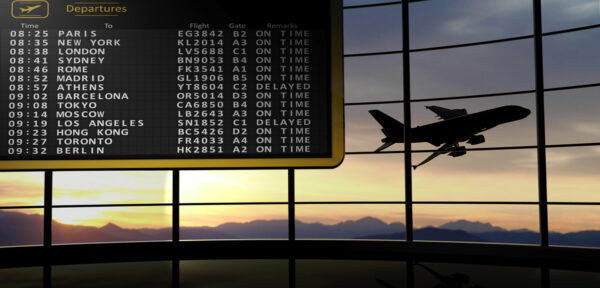Summer is finally coming to the Northern Hemisphere – yeah! Aviation entities are enthusiastic about welcoming travelers to what might be the biggest travel season seen in years. People just want to disconnect from work and daily life. With Covid basically behind us, who wouldn´t be eager to spend time at breathtaking locations, beautiful beaches and buzzing nightlife? But recalling last year´s summer, we ask ourselves, “Are the airlines ready to meet the increased demand?” “What about those unresolved issues that tested punctuality in aviation?”
Half of all European flights were delayed last summer
Last summer was a tough one for aviation. Eurocontrol suggests that 50% of European flights were delayed. At key airports, there was a 33% increase in arrivals behind schedule compared with 2019. This reflects an average of 16.9 minutes per flight. Departure punctuality, on the other hand, was below 50% at the beginning of July and rarely rose above 60% for the next two months.
Flight cancelations were also common at many European airports. In 2022, nearly 2,000 flights were canceled daily with 6.9% of scheduled flights not taking off at all. That is nearly double the 2019 average.
If we take a look at some 2022 U.S. performance stats, we note a similar pattern. It is estimated that an average of one out of five flights a day arrived behind schedule. According to FlightAware, this represents a total of more than 820,000 delayed flights. Over 116,000 flights were canceled.
Why is punctuality in aviation difficult to achieve?
Generally speaking, there are various reasons for flight delays. Sometimes, they are linked to factors within airlines’ control such as scheduling and staffing. But they can also be linked to unexpected events such as bad weather. Overall, experts agree that the main reason for poor on-time performance in 2022 was the industry’s struggle to accommodate high numbers of passengers and flights following declines experienced during the pandemic.
Staff shortages were one of the main causes, if not the main cause, of the chaos. Thousands of aviation staff were laid off during the Covid crisis when the industry was in survival mode. Even though fewer flights are operating now than in 2019, and staff has been recalled, the need for a qualified workforce remains. Having adequate staff can make the difference between an airline being able to recover its schedule within a few hours following an operational irregularity and an airline having to mass-cancel flights over a day.
Numbers don´t lie: People are eager to fly
Despite higher living costs due to ongoing international conflicts, persistent high inflation, and tighter financial conditions, travelers are not willing to give up their vacation plans. According to Expedia, flight searches increased 25% overall for June through August compared to the same period last year. Moreover, new research points out higher spending on flights and holidays in the first three months of 2023 compared to 2022.
With ticket prices rising, figures also show a trend towards more budget-friendly options. In the UK for instance, the average amount people spent on standard flights fell by 2% in 2023, while they increased by 12% for budget airlines.
International travel restrictions are long gone, and passengers have regained confidence to fly. This is reflected in the stats registered for the first quarter of the year, where global traffic reached 88% of March 2019 levels. Growth will continue, with passenger numbers set to surpass pre-pandemic levels by 3% by year-end. Yet, the industry must prepare for what will come.

Focus on improving ground operations is key
We discussed earlier that traveler volumes for the upcoming summer season are expected to be higher than in 2022. With lessons learned, aviation entities don´t want to make the same mistakes and are preparing in advance for what should be a prosperous travel season. Still, how will they deal with the ongoing shortage of qualified manpower? An optimized allocation of available resources will be crucial to face the challenges. That is achieved with efficient ground operations management.
Efficient ground operations are key to ensure punctuality in aviation. Ground handling involves tens of procedures such as aircraft fueling, baggage handling, and passenger boarding. Some of these activities may be carried out internally by the airline, while others are outsourced to third-party ground handling or ramp-service agents. It also requires coordination among many stakeholders, such as pilots, cabin crew, customer service personnel, cleaners, security, agents, and ramp personnel. Getting an aircraft ready for the next flight has its own complexity.
Advanced IT solutions can help to achieve punctuality in aviation
When not conducted optimally, ground operations can challenge punctuality in aviation. The so-called knock-on effect where a delayed flight leads to other delays can be very costly for airlines (e.g., rebooking, hotel stay or compensation). Reacting on the spot to operational irregularities might prompt resource shortages for ground handlers. This can occur quickly. Thus, they are unable to provide sufficient and timely service. Subsequently, passenger satisfaction and airline reputation are affected.
Ground operations need proactive management and monitoring. Advanced software helps to achieve that. Apart from implementing a turnaround management strategy, software solutions enable real-time monitoring of all major clearance activities, milestones, as well as their interdependencies. This facilitates the early identification of potential bottlenecks which can be communicated to the staff responsible for the task. The flight and handling details monitored serve as the basis for predicting potential flight delays with a high level of accuracy, paving the way for appropriate actions to prevent operational disruptions.
Many things have changed since the pandemic. Air travel as it used to be may not come back. But we can expect 2023 to be different. We can expect it to be the first year when some of the prior “normality” returns with super busy airports and airlines and no restrictions.
>> Do you think aviation is well prepared for summer travel 2023? Let us know in the comments below.





0 comments on “Ready for Summer? Peak Season Challenges Punctuality in Aviation”